
The annual volume of composite waste generated by the marine industry each year is a staggering 55,000 tonnes – and it’s predicted to increase by 10% every year in the near future as more and more leisure yachts reach their end of life (EOL). Glass reinforced plastic (GRP), commonly known as fibreglass, is the wonder material that created the modern leisure marine industry back in the 1960s, transforming what was once an artisanal, predominantly wood-based industry, into the high volume mass production model now pumping out an estimated 10,000 new boats in the UK alone each year. However, GRP, and the successful lightweight, rigid structures it produces were never designed with an EOL solution in mind, leaving today’s boatbuilding industry scratching its head for a solution to what is becoming an increasingly urgent problem.
There are an estimated six million boats in the EU at the moment, 95% of which are made of GRP. Each year, 1-2% (60,000120,000) reach the end of their usable life.
The fate of these craft is relatively unknown but it’s estimated that only 2,000-3,000 are properly recycled each year. And, unfortunately, there are several fundamental challenges that currently restrict the marine industry and its ability to solve this problem. Composite structures, such as GRP, by their very nature are designed to last a long time, delivering very specific material properties. Stronger than many metals by weight, non-conductive, and with the ability to be moulded into highly complex shapes, GRP is the perfect material for making boats in high volumes and at low cost. However, the process of combining glass fibre with a thermoset resin to achieve the properties modern designs need results in a structure that was never meant to ever be separated again.
この記事は Yachting Monthly UK の May 2023 版に掲載されています。
7 日間の Magzter GOLD 無料トライアルを開始して、何千もの厳選されたプレミアム ストーリー、9,000 以上の雑誌や新聞にアクセスしてください。
すでに購読者です ? サインイン
この記事は Yachting Monthly UK の May 2023 版に掲載されています。
7 日間の Magzter GOLD 無料トライアルを開始して、何千もの厳選されたプレミアム ストーリー、9,000 以上の雑誌や新聞にアクセスしてください。
すでに購読者です? サインイン

Midsummer on Hanö
This wonderful little island in the south-east of Sweden is a real gem off the beaten track
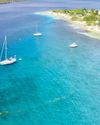
ADVENTURE SAILING TO HAITI
After spending two months in the Dominican Republic, Andy Brown sails west to Haïti bringing medical and school supplies to the town of Mole Saint Nicholas
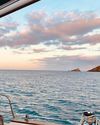
In celebration of bad sailing
New owner Monty Halls tests his sailing skills with his family aboard their Colvic 34 ketch, Sobek. A recently qualified Day Skipper, Monty faces a few unexpected challenges...

Winter brings excitement and opportunity
Oddity’s double glazing, insulation and heating create a warm, homely environment as I bash out this column.
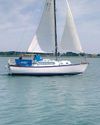
ADVENTURE MAISIE GOES TO GOES
To depart or not to depart? That is the question. Is it safer to stay, or suffer the wind and weather of a rough North Sea?
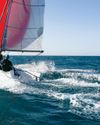
'MAYDAY, GRANDAD OVERBOARD!'
When David Richards and his grandson Henry went out racing from lowey, they didn't expect their sail to end with a lifeboat rescue
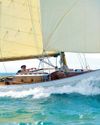
VERTUE
For a 25-footer, the Vertue has a huge reputation and has conquered every ocean. So what makes this little boat quite such an enduring success? Nic Compton finds out

Sailing siblings
Mabel Stock, her brother Ralph, a friend Steve and an unnamed paying passenger passed through the Panama Canal in December 1919 on the sturdy Norwegian cutter Ogre. They were towed to a quiet anchorage in Balboa away from the boat traffic but within rowing distance of the shore.
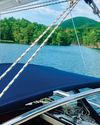
TECHNICAL MAINSAIL MODIFICATIONS
Safety and performance improved hugely when Mike Reynolds reduced the size of his mainsail and re-configured the systems controlling it
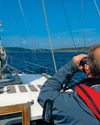
PILOTAGE DONE PROPERLY
Chartplotters are an amazing aid, but can detract from your real-world pilotage if not used with caution, says Justin Morton